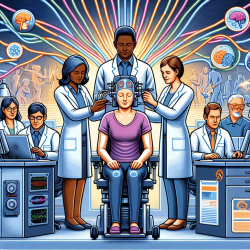Introduction
In the realm of augmentative and alternative communication (AAC) technologies, Brain-Computer Interfaces (BCIs) stand out as a beacon of hope for individuals with late-stage Amyotrophic Lateral Sclerosis (ALS). The recent research article titled "Towards clinical application of implantable brain–computer interfaces for people with late-stage ALS: medical and ethical considerations" provides an in-depth analysis of the potential and challenges of BCIs in clinical settings. This blog will explore how practitioners can leverage these findings to enhance their skills and contribute to improved outcomes for individuals with ALS.
The Promise of BCIs
BCIs offer a novel approach to communication by bypassing the need for muscle movement, which is often compromised in ALS. By using neural signals, BCIs enable individuals to control computers and communication software, thus offering a lifeline for those who can no longer rely on traditional AAC devices. The research highlights significant advancements in BCI technology, including successful home use of both non-implanted and implanted systems.
Clinical Implications
The transition of BCIs from research to clinical application requires careful consideration of both medical and ethical factors. Practitioners can play a crucial role in this process by:
- Engaging in multidisciplinary teams to address the complex needs of ALS patients.
- Participating in ongoing research to validate the effectiveness and usability of BCIs in real-world settings.
- Ensuring informed consent processes are robust and sensitive to the unique challenges faced by individuals with ALS.
Ethical Considerations
BCIs present unique ethical challenges, particularly concerning informed consent and the potential impact on patient autonomy. Practitioners must be vigilant in ensuring that patients and their families fully understand the implications of BCI technology, including the potential risks and benefits. This understanding is crucial for making informed decisions about the use of BCIs.
Call to Action
For practitioners interested in advancing their skills and contributing to the field, the following actions are recommended:
- Stay informed about the latest developments in BCI research and technology.
- Engage with interdisciplinary teams to foster a holistic approach to ALS care.
- Advocate for ethical standards and practices in the deployment of BCIs.
To read the original research paper, please follow this link: Towards clinical application of implantable brain–computer interfaces for people with late-stage ALS: medical and ethical considerations.










